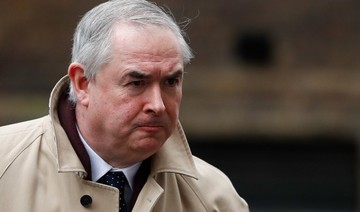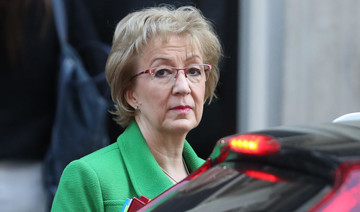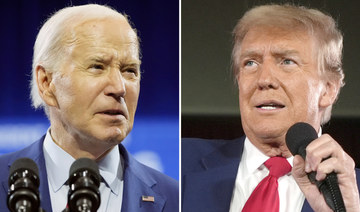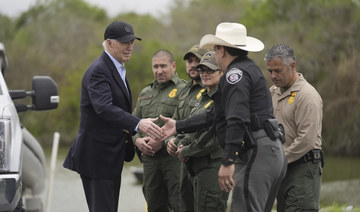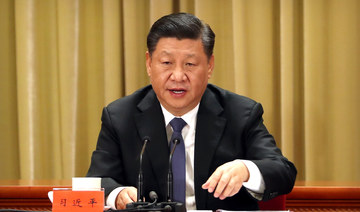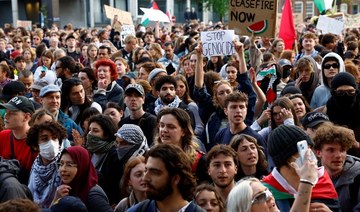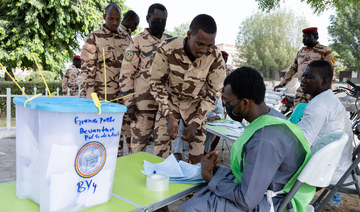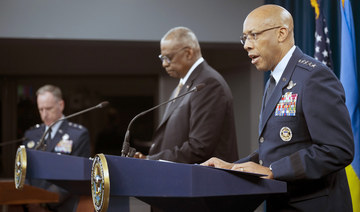LONDON: British MPs resoundingly rejected Prime Minister Theresa May’s Brexit deal for a second time on Tuesday, plunging the country into further uncertainty just 17 days before it is due to split from the European Union.
The House of Commons voted 391-242 against the divorce deal, even after May secured further guarantees from Brussels over its most controversial elements.
The move risks unleashing economic chaos, as Britain is scheduled to end ties with its biggest trade partner after 46 years on March 29, no matter what.
Appearing before MPs in a voice half-breaking due to a cold, May defiantly vowed to fight on, saying she “profoundly” rejected the outcome.
“The deal we’ve negotiated is the best and indeed the only deal,” she told the hushed chamber moments after the vote.
May promised to allow MPs to vote on a “no deal” option on Wednesday and, if that is rejected as expected, to decide on Thursday whether to ask the EU to delay Brexit.
She said parliament faced “unenviable choices” if it voted for an extension, including revoking Brexit, holding a second referendum or leaving with another deal.
However, euroskeptics believe the current deal is so bad that it is worth the risk of leaving with no plan.
The latest vote comes two years after Britain set the clock ticking on its departure from the EU following a highly divisive referendum in 2016.
Michel Barnier, the EU chief Brexit negotiator, said Brussels had nothing more to offer and must now brace for the possibility of a messy divorce.
“The EU has done everything it can to help get the Withdrawal Agreement over the line,” Barnier tweeted.
“The impasse can only be solved in the #UK. Our ‘no-deal’ preparations are now more important than ever before.”
But a spokeswoman for European Commission chief Jean-Claude Juncker said EU members would consider a “reasoned request” for a Brexit delay.
Germany’s foreign minister said Tuesday that it was becoming increasingly likely that Britain would crash out of the bloc with no deal in place, accusing the country of “gambling carelessly with the well-being of citizens and the economy.”
“Unfortunately, I can only say that at the moment Germany has prepared for all the worst cases as well as possible,” Heiko Maas said.
Jeremy Corbyn, leader of the main opposition Labour party who has been trying to force snap elections, said May must now admit that her government’s overarching strategy had failed.
“Their deal, their proposal, the one the prime minister’s put, is clearly dead,” Corbyn said, calling on her to negotiate for a softer Brexit to keep close economic ties with the EU.
After MPs first rejected the 585-page Brexit deal in January, May promised changes to the hated backstop plan which is intended to keep open the border with EU member Ireland.
She announced she had secured the promised “legally binding changes” to the backstop — which would keep Britain in the EU’s customs union if and until a new way was found to avoid frontier checks — after a last-minute trip to Strasbourg to meet EU leaders on the eve of the vote.
Hours later, however, Attorney General Geoffrey Cox said the additions would not completely allay MPs fears of being trapped in the arrangement forever.
It did not take long for Brexit-supporting MPs in May’s Conservative party, and her allies, Northern Ireland’s Democratic Unionist Party (DUP), to declare their opposition.
Some euroskeptics did change their mind, urging their colleagues not to risk everything.
Former minister Edward Leigh said: “You may not like the deal, it’s not perfect, but it delivers Brexit and let’s go for it.”
But the margin of Tuesday’s defeat was not substantially smaller than the 230-vote thumping the plan suffered on January 15.
The pound, which has been highly volatile since the 2016 referendum, initially rose after the vote but then sank against both the euro and dollar.
The backstop is designed to protect the peace process in Northern Ireland, which involved the removal of border checks with the Republic of Ireland.
Brexit supporters wanted a unilateral way out of it, or a time limit to the arrangement, but the EU said this would make it worthless.
Leaders across Europe also united behind a message that this was the best and final offer Britain could expect.
“There will be no third chance,” Juncker said after his talks on Monday with May.
If MPs vote against a no-deal exit on Wednesday, and want to postpone Brexit, the other 27 EU nations would need to agree.
Their leaders will meet in Brussels for a summit on March 21-22.
But any postponement may have to be short-lived.
Juncker on Monday said Brexit “should be complete before the European elections” at the end of May.
British MPs resoundingly reject Brexit deal for second time
British MPs resoundingly reject Brexit deal for second time
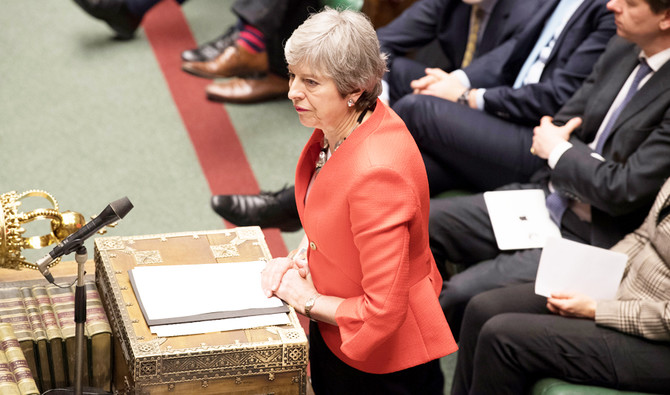
- House of Commons voted by 391 to 242 to reject the divorce deal
- May promised to allow MPs to vote on a "no deal" option on Wednesday
India vote a chance for Kashmiris to signal opposition to Modi
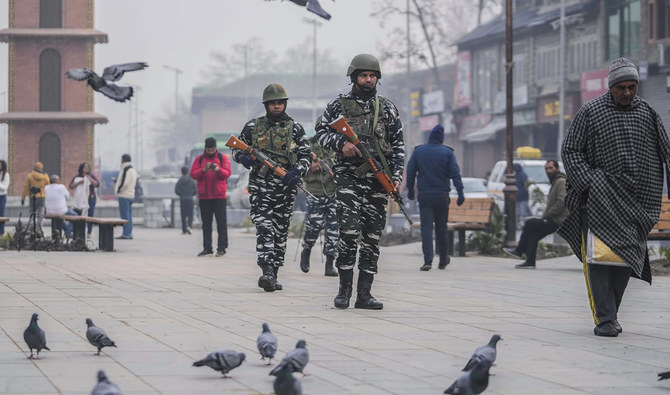
- Widely expected to win poll, Modi’s Bharatiya Janata Party (BJP) did not field any candidates in Kashmir for the first time in nearly three decades
- Modi’s government canceled the limited autonomy Kashmir had under India’s constitution in 2019, accompanied by a huge security clampdown
SRINAGAR: Prime Minister Narendra Modi’s campaign speeches claim his quelling of an insurgency in Kashmir as one of his greatest achievements, but many in the disputed region see India’s election as a chance to signal their disagreement.
Widely expected to win the biggest poll in history, Modi’s ruling Bharatiya Janata Party (BJP) did not field any candidates in Kashmir for the first time in nearly three decades. Experts say they would have been roundly defeated if they had.
Modi’s government canceled the limited autonomy Kashmir had under India’s constitution in 2019, a move accompanied by a huge security clampdown, mass arrests of local political leaders and a months-long telecommunications blackout.
Violence in the Muslim-majority region has since dwindled, and the BJP has consistently claimed that its residents supported the changes.
But some Kashmiri voters in this year’s national elections will be eager to express their frustrations with the end of their territory’s special status.
“I have never voted in the past. But this time, I will... to show that I am not happy with what India is doing with us,” a middle-aged man told AFP in the main city of Srinagar, declining to be identified for fear of retribution.
“How can India say that Kashmiris are happy when we are actually suffocating in a state of fear and misery?“
Kashmir has been divided between India and Pakistan since their independence in 1947. Both claim it in full and have fought two wars over control of the Himalayan region.
Rebel groups opposed to Indian rule have waged an insurgency since 1989 on the side of the frontier controlled by New Delhi, demanding either independence or a merger with Pakistan.
The conflict has killed tens of thousands of soldiers, rebels and civilians in the decades since, including a spate of firefights between suspected rebels and security forces in the past month.
India is in the middle of a six-week election, with voting staggered across phases to ease the logistical burden of staging a vote in the world’s most populous country.
Modi and his ministers have championed the end of Kashmir’s special status, saying at campaign rallies it has brought “peace and development,” and the policy is popular among voters elsewhere in India.
But many in the valley have chafed at increasing curbs on civil liberties that have curtailed media freedoms and brought an effective end to once-common public protests.
Many are also upset with the 2019 decision to end constitutional guarantees that reserved local jobs and land for Kashmiris.
Open campaigning for separatism is illegal in India, and established democratic parties in Kashmir have historically differed on whether to collaborate with the government of the day in New Delhi or to pursue greater autonomy.
But antipathy toward Modi’s Hindu nationalist government had helped paper over differences between rival parties by forging a common sense of opposition, parliamentary candidate Waheed Ur Rehman Para told AFP.
“There’s a huge solidarity silently in Kashmir today for each other, irrespective of party lines,” he said.
Para is standing for a seat that takes in Srinagar, the territory’s biggest city, on behalf of the Peoples Democratic Party (PDP), which was a BJP ally before 2019 but is now campaigning for the reinstatement of Kashmir’s autonomy.
Voters were preparing to “convey to Delhi that the consent of decisions about Kashmir is most important and it should lie with the locals,” he said.
Political analyst and historian Sidiq Wahid told AFP the election was being seen by Kashmiris as a “referendum” on the Modi government’s policies in the territory.
“The BJP is not fielding any candidates for a very simple reason,” he said. “Because they would lose, simple as that.”
Modi’s party retains a presence in Kashmir in the form of a heavily bunkered and almost vacant office in Srinagar.
The complex is under constant paramilitary guard by some of the more than 500,000 troops India has permanently stationed in the region.
The BJP has appealed to voters to instead support smaller and newly created parties that have publicly aligned with Modi’s policies.
India’s powerful home minister Amit Shah, a close acolyte of Modi, said at a campaign rally last month the party had made a tactical decision not to field candidates.
He said he and his allies were in no rush to “see the lotus bloom” in Kashmir, a reference to the BJP’s floral campaign emblem, but would instead wait for the people of the valley to understand its good work.
“We are not going to conquer Kashmir,” he told the crowd. “We want to win every heart in Kashmir.”
Republican veepstakes: who will complete the Trump ticket?
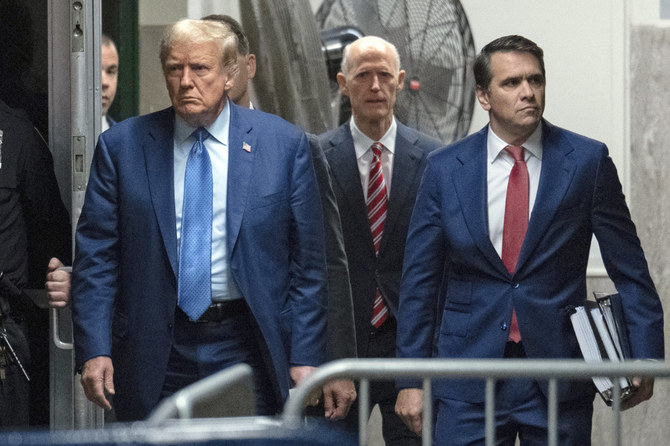
- All eyes are on White House hopeful Donald Trump as he considers potential running mates
- A shrewd vice presidential pick could help the Republican tycoon broaden his support base
WASHINGTON: It could be a loyal lieutenant, an ex-rival or perhaps a political newcomer, but one thing is certain: all eyes are on White House hopeful Donald Trump as he considers potential running mates.
A shrewd vice presidential pick could help the Republican tycoon broaden his support base, and a handful of names have emerged as most likely to appear at Trump’s side as he limbers for a second showdown with Joe Biden in November.
Here are the most commonly-cited runners and riders.
It is no secret that Trump likes what Scott’s profile says about the staunchly conservative, deeply religious African American US senator from South Carolina — and what it would say about the Republican ticket.
The former president is constantly praising the 50-year-old, his one-time rival for the Republican nomination, for his loyalty.
“You’re a much better candidate for me than you were for yourself,” Trump told Scott at a recent rally.
With Scott as his right-hand man, Trump would hope to make inroads with Black voters, who largely preferred Biden in 2020.
But detractors criticize the senator for lacking the presence required to assert himself, particularly during debates.
Stefanik, 39, was a considered a moderate when she entered Congress, but her lurch to the right during a meteoric rise to the Republican leadership can be explained in two words: Donald Trump.
The New York congresswoman has embraced all of the billionaire’s causes, winning his approval and appreciation in return.
A Trump campaign with Stefanik on the ticket could win back some of the women that have turned away from Trump since his 2016 victory.
But the fervent Trump loyalist could also turn off more moderate voters.
Vance hasn’t always been a fan of Trump, something the former president enjoys bringing up from time to time.
But count the 39-year-old former military officer out at your peril.
Known for a best-selling memoir on the travails of poor, white America, Vance entered politics relatively recently.
The first-term senator from Ohio has already made plenty of allies in Republican circles, not least because of his ability to raise large sums of money for his party.
In a country where election victories can cost billions of dollars, big fundraisers are rarely short of friends.
Trump and Marco Rubio have history.
The Florida senator was pitted against the real estate tycoon in the 2016 Republican primary, during which Rubio openly mocked his more popular rival over his complexion, and for having small hands.
But the former adversaries seem to have buried the hatchet.
Trump will weigh the potential for an electoral boost among Hispanic voters with the selection of the 52-year-old son of Cuban immigrants, who takes a keen interest in foreign policy.
A section of the hard right, however, has never forgiven Rubio for pushing immigration reforms more than 10 years ago that they saw as too liberal.
Trump’s last rival in the Republican primaries would be a surprising pick indeed. But a Vice President Nikki Haley isn’t out of the question.
The 52-year-old has yet to endorse the man who, during the final months of the primary campaign, referred to her as “birdbrain.”
But the former South Carolina governor is popular with the moderates and independents that Biden is keen to wrest from the Republicans — and that Trump would do well to court.
North Dakota governor Doug Burgum and Florida senator Rick Scott have also been mentioned as possibilities, although — as fellow rich, white men — they would offer little contrast from Trump.
Vivek Ramaswamy — the upstart newcomer who shook up the first Republican primary debate — is also on the fringes of the conversation, alongside Congressman Byron Donalds, another Floridian, and firebrand former TV presenter Kari Lake.
Long seen as a credible contender, South Dakota governor Kristi Noem has seen her political stock plummet since she recounted having shot dead a pet dog she was unable to bring to heel.
AFP reached out to the Trump team for a hint on the kind of candidate that might turn the candidate’s head. A campaign aide demurred.
“Anyone claiming to know who or when President Trump will choose his VP is lying, unless the person is named Donald J. Trump,” he said.
Chinese companies hit with US trade restrictions over spy balloon incident

- Sanctions show the Biden administration is continuing to punish Beijing over the spy balloon, which drifted over the US in February 2023
- The trade restriction list has been used aggressively by the US to stem the flow of technology to China amid concerns Beijing could use it to bolster its military capabilities
WASHINGTON: The Biden administration added 37 Chinese entities to a trade restriction list on Thursday, including some for allegedly supporting the spy balloon that flew over the United States last year, heightening tensions between Beijing and Washington.
The Commerce Department also said it was adding some units of China Electronics Technology Group to the list for allegedly trying to obtain American technology to support China’s quantum technology capabilities, “which has serious ramifications for US national security” due to their military applications.
Media have said state-owned China Electronics Technology Group is a top military equipment supplier.
China Electronics Technology Group could not immediately be reached for comment.
The Chinese embassy in Washington called the move “blatant economic coercion and bullying in the field of technology,” and said China would resolutely safeguard the lawful rights of Chinese firms and institutions.
The announcement shows the Biden administration is continuing to punish Beijing over the spy balloon, which drifted over the United States in February 2023, fueling political outrage in Washington and prompting Secretary of State Antony Blinken to cancel a trip to China.
That month, the Commerce Department added five companies and one research institute to the entity list for supporting “China’s military modernization efforts, specifically the People’s Liberation Army’s (PLA) aerospace programs including airships and balloons.”
China’s foreign ministry had said it was a weather balloon that had blown off course and accused the United States of overreacting.
The trade restriction list, known as the entity list, has been used aggressively by the United States to stem the flow of technology to China amid concerns Beijing could use it to bolster its military capabilities.
Being added to the list makes it harder for US suppliers to ship to the targeted entities.
The Biden administration on Thursday also added a handful of Chinese entities to the list for trying to obtain American items for making drones to be used by the Chinese military and others for shipping controlled items to Russia.
Thwarted by US, Palestinians look to UN General Assembly
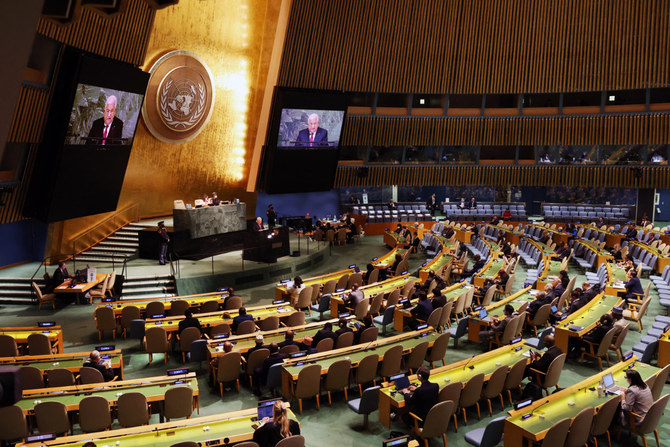
- Observers say a resolution at the UNGA calling for full UN membership of Palestinians is likely to win broad majority support
- To succeed, the initiative needs a Security Council green light and then a two-thirds majority vote in the General Assembly
UNITED NATIONS: After a US veto foiled the Palestinians’ drive for full UN membership, the General Assembly is expected on Friday to grant them some additional rights in the global body — a symbolic win that has already irked Israel.
With the war in Gaza raging, the Palestinians in April relaunched a request dating back to 2011 to become full members of the United Nations, where their current status is a “non-member observer state.”
To succeed, the initiative needed a Security Council green light and then a two-thirds majority vote in the General Assembly.
But the United States — one of five veto-holding members on the Security Council and Israel’s closest ally — blocked it on April 18.
Now the Palestinians are turning to the General Assembly, where diplomats and observers say a resolution calling for their full UN membership is likely to win broad majority support.
The draft resolution, introduced by the United Arab Emirates, says “the State of Palestine is qualified for membership in the United Nations in accordance with article 4 of the Charter and should therefore be admitted.”
It calls on the Security Council to “reconsider the matter favorably.”
That is unlikely to occur, as the United States opposes any recognition of statehood outside of a bilateral accord between the Palestinians and Israel, whose current right-wing government is adamantly opposed to a two-state solution.
“You could have a sort of diplomatic doom loop, with the Assembly repeatedly calling for the Council to grant Palestine membership and the US vetoing it,” said Richard Gowan, an analyst with the International Crisis Group.
The draft resolution nonetheless gives the Palestinians certain “additional rights and privileges” starting in the next session of the General Assembly, in September.
The text explicitly rules out letting them be chosen to sit on the Security Council or to vote in the General Assembly.
But it would let the Palestinians submit proposals and amendments directly, without having to go through another country, as is the case now.
It would also give them the right to be seated among member states in alphabetical order.
“When you build a building, you build it one brick at a time. If some think it’s symbolic, for us it’s important as we are moving forward toward our natural and legal right to be a full member of the UN,” Palestinian ambassador Riyad Mansour told reporters Thursday.
“The symbolism is what matters,” said Gowan. “This resolution is a very clear signal to Israel and the US that it is time to take Palestinian statehood seriously.”
Israel has criticized the initiative, with ambassador Gilad Erdan saying it will “grant the Palestinian Authority the rights of a state de facto” and violates the UN Charter by “bypassing the Security Council.”
The United States also expressed reservations.
“We’re concerned about the precedent it sets,” said deputy US ambassador Robert Wood.
An earlier draft of the resolution was more vague, granting “the State of Palestine the rights and privileges” necessary to take part in the work of the assembly “on equal footing with Members States” but without specifying what rights.
The new version is in line with the UN charter, said Samuel Zbogar, the ambassador of Slovenia, which currently sits on the Security Council.
“It makes clear what additional rights will Palestine get as observer but it doesn’t touch on those elements that belong only the members,” he added.
As Israel presses on with its war in Gaza against Hamas in response to the October 7 attack, the UN vote will allow the Palestinians to see which countries support them.
It may also show that — were it not for the US veto — the Palestinians would have enough votes in the assembly for full UN membership.
In December, 153 countries out of 193 backed a call for an immediate ceasefire in the Gaza war. Ten voted against, including the United States, while 23 abstained.
Chad’s military ruler declared winner of presidential election, while opposition disputes the result
Chad’s military ruler declared winner of presidential election, while opposition disputes the result
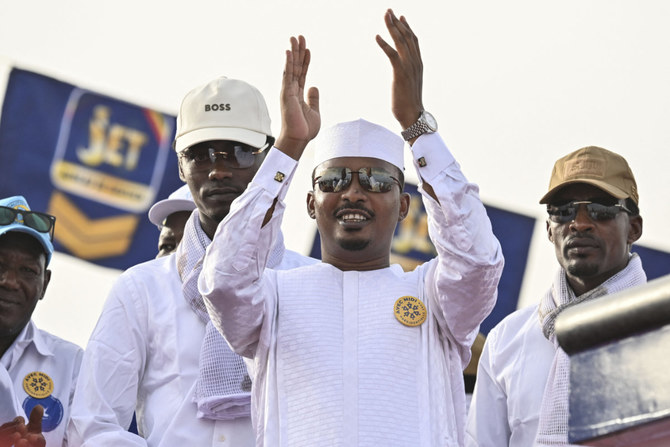
- Election body says Mahamat Deby Itno won with over 61 percent of the vote and runner-up Succès Masra got over 18.5 percent
- Deby Itno seized power after his father, who spent three decades in power, was killed fighting rebels in 2021
N’DJAMENA: Chad’s military leader, Mahamat Deby Itno, was declared the winner of this week’s presidential election, according to provisional results released Thursday. The results were contested by his main rival, Prime Minister Succès Masra.
The national agency that manages Chad’s election released results of Monday’s vote weeks earlier than planned. The figures showed Deby Itno won with just over 61 percent of the vote, with the runner-up Masra falling far behind with over 18.5 percent of the vote. Gunfire erupted in the capital following the announcement.
Preliminary results were initially expected on May 21.
Chad held its long delayed presidential election following three years of military rule, a vote that analysts widely expected the incumbent to win. Deby Itno, also known as Mahamat Idriss Deby, seized power after his father, who spent three decades in power, was killed fighting rebels in 2021.

The oil-exporting country of nearly 18 million people hasn’t had a free-and-fair transfer of power since it became independent in 1960 after decades of French colonial rule.
Hours ahead of Thursday’s announcement, Masra published a speech on Facebook accusing the authorities of planning to manipulate the outcome.
During the 11 minute speech, Masra appeared in a blue suit at a podium with the national flag in the background and claimed victory, saying the incumbent was planning to reverse the outcome of the vote. He called on Chad’s military, police and other security forces to stop following Deby Itno’s orders.
“These orders will lead you to side with the wrong side of Chad’s history, these orders will lead you to fight your brothers and sisters, these orders will lead you to commit the irreparable and unforgivable,” he said in the speech. “Refuse to obey these unjust orders!”
There was no immediate response from the president’s office.
Masra, president of The Transformers opposition party, fled Chad in October 2022. The country’s military government at the time suspended his party and six others in a clampdown on protests against Deby Itno’s decision to extend his time in power by two more years. More than 60 people were killed in the protests, which the government condemned as “an attempted coup.”
An agreement between the country’s minister of reconciliation and Masra’s political party late last year allowed the exiled politician and other opposition figures to return to Chad. He was later appointed prime minister.
Chad is seen by the US and France as one of the last remaining stable allies in the vast Sahel region following military coups in Burkina Faso, Mali and Niger in recent years. The ruling juntas in all three nations have expelled French forces and turned to Russia’s mercenary units for security assistance instead.



